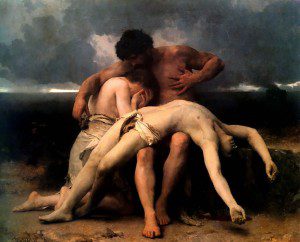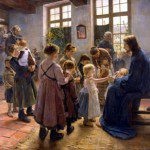The First Mourning by William-Adolphe Bouguereau
Then the Lord asked Cain, “Where is your brother Abel?” He answered, “I do not know. Am I my brother’s keeper?”
– Genesis 4:9
It was 1942, just after the Feast of the Visitation, that Thomas Merton received word. He was going to have a visitor. The two couldn’t have been on more divergent paths. Thomas Merton was a novice aspiring to be a monk at Gethsemani, a Trappist monastery in Kentucky. His brother, John Paul, was a soldier preparing for war. In short order, John Paul would be shipped overseas to an uncertain fate. But before he left, he wanted to see his brother.
It had been some time since the Merton brothers had seen each other. Periodic letters were exchanged, but they did not have the depth of closeness that sometimes emerges between siblings raised in trying circumstances. They had moved a lot as children living in France, America and England. Though he loved them deeply, their father was absent much of the time due to his international work as an artist. Their mother died an untimely death from stomach cancer. The brothers would live with uncles, aunts and grandparents. To this point, their life was defined by wandering…from family to family, from country to country, from uncertainty to uncertainty.
But after years of wandering and struggling and searching, Thomas Merton had arrived. He had found Truth in his conversion to Catholicism and peace in his vocation to the religious life. And now his brother was coming.
In Thomas Merton’s autobiography, The Seven Storey Mountain, he recalls John Paul’s malaise from only a few year before.
“This was the year [John Paul] was supposed to graduate from Cornell, but it turned out that things had gone wrong, and he was not graduating after all. The bored, lost, perplexed expression that wrinkled his forehead, the restlessness of his walk, and the joyless noisiness of his laughter told me all I needed to know about my brother’s career. I recognized all the tokens of the spiritual emptiness that had dogged my own steps from Cambridge to Columbia.”
But while living a life that wandered from Cornell to Mexico to the military, John Paul had simultaneously witnessed his brother’s transformation. Had John Paul considered becoming a Catholic? Maybe. Would he possibly talk with a priest? Perhaps. The door was cracked. But it was difficult to say if it was opening or shutting.
And now here he was.
Upon arrival at the monastery, Thomas laid eyes on his square shouldered brother destined for war and ushered him into a room. He wasted no time.
I began to ask him if he didn’t want to get baptized. ‘I sort of hoped I could be,’ he said. ‘Tell me,’ I said, ‘how much instruction have you had, anyway?’ ‘Not much,’ he said. After I had questioned him some more, it turned out that ‘not much’ was euphemism for ‘none at all.’ ‘But you can’t be baptized without knowing what it is all about,’ I said.
From that moment on, Thomas Merton felt the charge. He was charged with being his brother’s keeper. After speaking with the Father Master about his brother’s hopes for baptism, his lack of faith formation and his exceedingly brief stay at the monastery, the solution became very clear. Thomas would help form his brother. He would walk him to the baptismal font. The Father Master simply, yet urgently implored,
“Take him some books and talk to him and tell him everything you can.”
And so that’s what Thomas did.
Thomas grabbed piles of books from the Novitiate Common box as well as books specifically recommended by brother novices and monks. The Truth About Catholics, The Imitation of Christ, the Catechism of the Council of Trent, The Faith of Millions, and The Story of a Soul were a few titles among others. And he talked. And talked.
“I spent practically the whole of the morning and afternoon work period talking my head off [to John Paul] about everything I could think of that had something to do with the faith. It was much harder work than my fellow novices were doing out there in the cornfield – and much more exhausting.”
The existence of God, the Creation, the Trinity, the vital necessity of Faith & Grace. All were discussed in depth. As brother to brother, without pretense and with uncanny fellowship, Thomas and John Paul found that, in fact, they did understand each other. They recognized not only the wandering, aimless paths of their youth but, even more, the brilliantly sharpened contours of the certain road ahead. Each carried memories of a family upbringing with misplaced hopes in the ephemeral. Each recalled personal experiences in hot pursuit of the fleeting, empty phantoms of happiness. But now…now, as brother talking with brother, they understood that they were grasping and immersing themselves in the Eternal.
“As soon as I had begun to talk to him, I had seen awaken in his eyes the thirst that was hiding within him, and that had brought him to Gethsemani – for he certainly had not come merely to see me. How well I recognized it, the insatiable thirst for peace, for salvation, for true happiness.”
Over four days, through the grace of God, Thomas Merton poured out his heart and soul to his brother. He figuratively painted a lavish and beautiful portrait of his faith – a faith that Thomas struggled with deeply prior to his own glorious surrender and assent to conversion. He found himself blissfully spent, exhausted. And his brother seeking to slake his insatiable spiritual thirst simply requested,
“Go on, tell me some more.”
Ultimately, it was when Thomas Merton saw his brother after dinner – as the picture of complete serenity – that the supreme importance of this task, the task of being his brother’s keeper, truly dawned on him.
“Then I realized, obscurely, that in those last four days the work of eighteen to twenty years of my bad example had been washed away and been made good by God’s love…I was full of peace and gratitude.”
John Paul would be baptized. He would receive Communion with his brother. And then he would ride away from the monastery. Waving to his brother. Away. Away. He would marry. He would deploy. And John Paul Merton would go missing in action and die. It all happened less than a year after his four days with his brother.
A grieving Thomas Merton would compose this poem to privately eulogize his brother,
Sweet brother, if I do not sleepMy eyes are flowers for your tomb;And if I cannot eat my bread,My fasts shall live like willows where you died.If in the heat I find no water for my thirst,My thirst shall turn to springs for you, poor traveller.
Where, in what desolate and smokey country,Lies your poor body, lost and dead?And in what landscape of disasterHas your unhappy spirit lost its road?
Come, in my labor find a resting placeAnd in my sorrows lay your head,Or rather take my life and bloodAnd buy yourself a better bed —Or take my breath and take my deathAnd buy yourself a better rest.
When all the men of war are shotAnd flags have fallen into dust,Your cross and mine shall tell men stillChrist died on each, for both of us.
For in the wreckage of your April Christ lies slain,And Christ weeps in the ruins of my spring;The money of Whose tears shall fallInto your weak and friendless hand,And buy you back to your own land: The silence of Whose tears shall fall Like bells upon your alien tomb. Hear them and come: they call you home.
As Matthew tells us,
And one of them [a scholar of the law] tested him by asking, “Teacher, which commandment in the law is the greatest?” He said to him, “You shall love the Lord, your God, with all your heart, with all your soul, and with all your mind. This is the greatest and the first commandment. The second is like it: You shall love your neighbor as yourself. The whole law and the prophets depend on these two commandments.”
– Matthew 22:36-40
So.
Am I my brother’s keeper?
Yes. Yes I am.
Griffin, 13, has been carrying his brother Tyler, who has cerebral palsy, ever since he can remember. In between school activities and playing hockey seven times a week, Griffin makes time to shovel Tyler’s wheelchair ramp, get him dressed in the morning, help prepare his breakfast and medications. On some occasions, he pulls him to school on a sled. This day I caught Griffin lifting him out of his car seat and briskly carrying him across the schoolyard so he could spend some time with him on the play structure before heading to class. When asked if he ever wished he didn’t have to do all this stuff for Tyler, Griffin’s eyes well up as he quickly replies, “No, I don’t, he’s my brother and I love him very much. I will do this for him any day. There is no other way to describe it.” (excerpt courtesy of Ruth Bonneville, Winnipeg Free Press)













